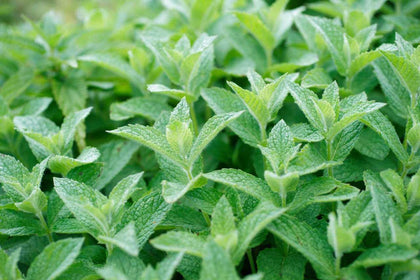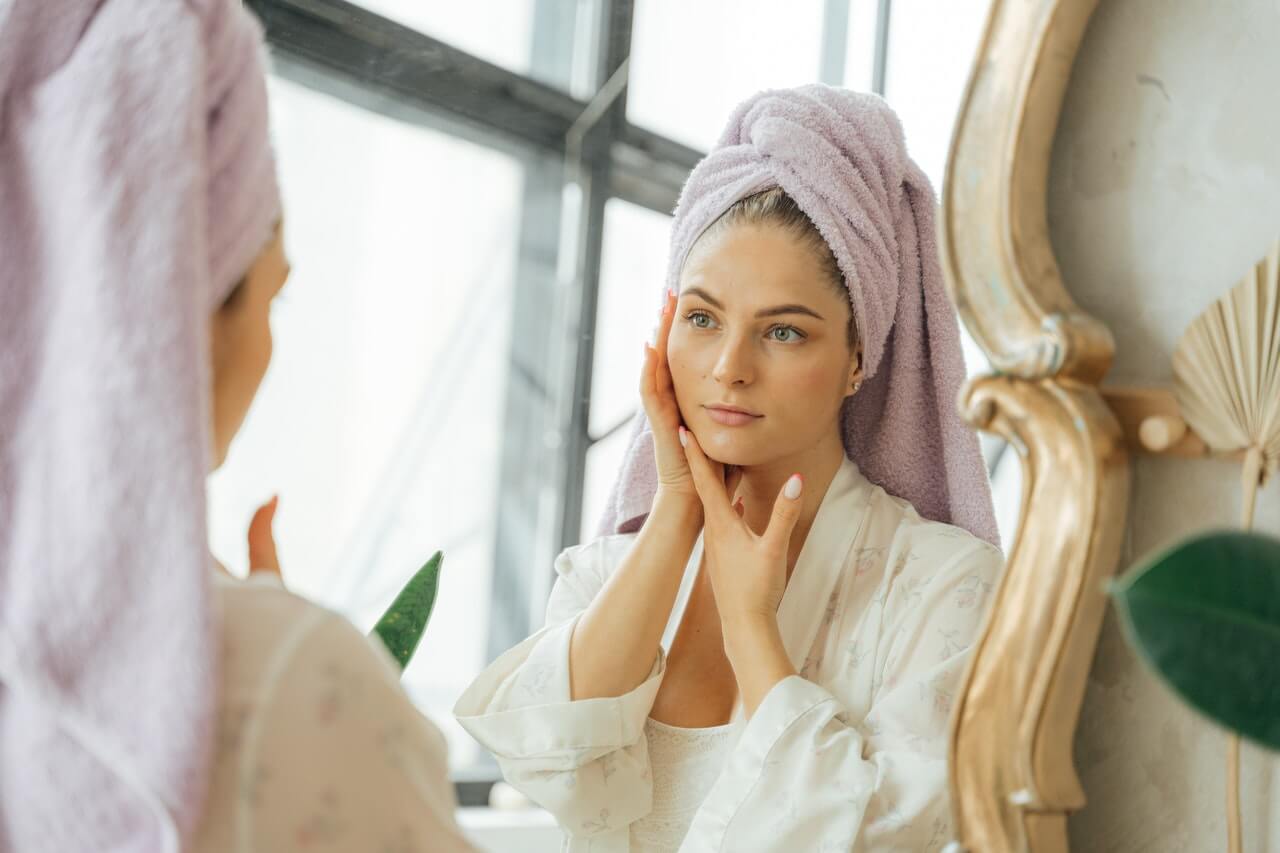Some DIY remedies for hair growth sound pretty dubious. A stinky onion juice mask, messy rice water and even slimy fish oil pop up after a Google search, but peppermint essential oil? It sounds refreshing — but does it work?
Essential oils get pretty mixed reviews when used as skin or haircare solutions. For some, peppermint oil is the hair growth product they can't live without. For others, not so much. Read on to find out more about peppermint oil's effect on the hair growth cycle, plus find out what products you really should be using to combat thinning hair.
What Is Peppermint Oil?
Simply put, peppermint essential oil is made from the peppermint herb and is known for its unique, refreshing scent. A bottle of peppermint oil contains a highly concentrated oil-based solution made up of the plant's leaves and flowers.
Peppermint oil hasn't been studied extensively, but some health benefits have been suggested. For example, if you suffer from irritable bowel syndrome, you might have heard peppermint tea helps because of its anti-inflammatory properties. In addition, due to its cooling effect, this minty oil is commonly used to treat muscle or nerve pain. Its refreshing aroma can also help encourage alertness.
Shop: GRO Collection for Hair Loss
How Can Peppermint Oil Help Your Hair?
Peppermint essential oil undoubtedly has many uses, but can you use this oil for hair growth? Very limited research shows that menthol applied to the skin can increase blood flow and blood circulation. The thinking goes that better blood circulation around the scalp could positively impact blood vessels, stimulate hair growth and increase follicle depth. As the peppermint oil gets to work, the vascular smooth muscle relaxes and potentially increases blood flow to increase hair thickness and regrow hair. Theoretically, peppermint oil could help someone struggling with female or male pattern baldness or other types of hair loss. And even though more studies are needed to produce conclusive results, peppermint oil is recognized by some experts to be helpful for certain hair and scalp issues.
Certified aromatherapist Alison Angold said, "Peppermint is a very warming and stimulating oil that, when applied to the scalp, can help to encourage circulation. This, in turn, will nourish the roots of the hair to grow strong locks and prevent loss. Peppermint is also very refreshing, so it can help with scalp issues such as dandruff."
In some studies, peppermint oil exhibited antifungal activity, suggesting it could be a good option for those living with dandruff. But, again, the research is limited. There isn't a clinical study that considers the specific benefits of peppermint essential oil or its effectiveness as a preventive alternative medicine.
Using Peppermint Oil for Hair Loss
Like most natural solutions, peppermint oil is considered pretty safe to use when used correctly. There aren't many downsides to giving it a try, but need to know how to apply it.
It's important to remember that essential oils, in general, are highly concentrated — far too concentrated to apply directly to the skin. So, before you put undiluted peppermint oil anywhere near your scalp, you'll need to mix it with a carrier oil.
A carrier oil is more dense and viscous than essential oils, which actually aren't oily at all. They don't always have a scent and are used to dilute essential oils, so they're safe to use. You could use a simple household oil, such as sunflower, vegetable, almond or grapeseed oil, but if you have oily skin or your scalp gets clogged quickly, something non-clogging like jojoba oil might work best.
Marula oil works beautifully as a carrier oil. It's naturally packed with antioxidants, omega fatty acids and oleic acid that deliver a wealth of beauty benefits. Use marula oil to tame flyaways and give frizzy locks and glossy finish. You can also use the versatile oil to smooth razor burn, prime the skin, improve the look of scars and tame mask acne.
Shop: Nicole Franzel's Healthy Hair Product Picks
How to Apply Peppermint Oil
If you're looking to try peppermint oil for hair loss, follow these instructions:
- Add a couple of drops of peppermint oil to one tablespoon of carrier oil (jojoba oil, marula oil or any household oil).
- Gently blend the two; be careful not to spill because oil can stain.
- Massage the oil mixture into the scalp. For added benefits, use a handheld scalp massager to cover the area effectively and increase relaxation. You might feel a cooling sensation as the peppermint hits the skin.
- Leave the scalp massage oil treatment on your scalp for up to 20 minutes, and then wash hair with shampoo as usual. If the feel of menthol becomes overpowering, rinse immediately.
Because there isn't any solid evidence on whether peppermint oil will promote hair growth, there's no real way to know how long the treatment should be left on the skin. So your best bet is trial and error, and immediately wash off if it feels uncomfortable.
If you don't want to use peppermint oil as a mask, consider adding about five drops to your favorite shampoo and conditioner.
However, before applying any essential oil to your skin, check that it is an acceptable grade for skin contact, and never use it without a carrier oil. Likewise, don't use oils designed for a diffuser because they're not intended for skin contact.
Who Should Use Peppermint Oil on Their Hair?
Angold told VEGAMOUR, "Most people should be able to use peppermint oil on their hair and scalp, although very sensitive scalps should proceed with caution and use only a drop of the oil. In addition to this, pure peppermint essential oil is incompatible with homeopathic medicines, so [it] should be avoided if taking any form of homeopathy."
If you're working with oily hair, peppermint oil might be a good solution to try. It's believed to balance out the scalp's production of sebum, leaving the hair clear of greasy residue and product buildup. You can also use a gentle, plant-based scalp serum to remove pore-clogging buildup and promote a healthy, balanced scalp microbiome.
A Plant-Based Alternative to Peppermint Oil
With only a shred of evidence suggesting peppermint oil could be an effective hair loss treatment, you're probably not going to change how your hair looks and feels radically.
If you're looking for a clinically proven alternative to pep up the overall health of your hair, GRO Hair Serum is a reliable solution. The plant-based, multitasking serum won't make hair feel greasy and works to support and sustain every hair follicle and the overall hair ecosystem. In addition, it soothes the scalp and is free from toxins. The unique all-natural blend is made up of vegan phyto-actives that have been proven in multiple clinical trials to increase the signs of hair density and reduce the signs of shedding. Apply consistently to see results in as little as 90 days!
Take a Holistic Approach to Hair Care
Although a peppermint oil as a hair loss solution might help, the evidence is limited, and the results are generally unfounded.
To combat hair loss and boost its wellness overall, we recommend a 360° approach. Good sleep hygiene combined with a nutritious diet and mindful routines that reduce stress will help. Also, consider adding targeted and clinically proven hair wellness products to your routine, which can help you achieve the thicker, fuller-looking locks you desire!
#include-related-slider#
More From VEGAMOUR
- 10 Vitamin Deficiencies That Can Cause Hair Loss
- 9 Biotin-Rich Vegan Foods for Healthy Hair
- How Long Does It Take for Hair to Grow?
- Shop Dominique Gebru's Favorite Hair Products
Photo credit: Nikita Turkovich/Unsplash
Back



















